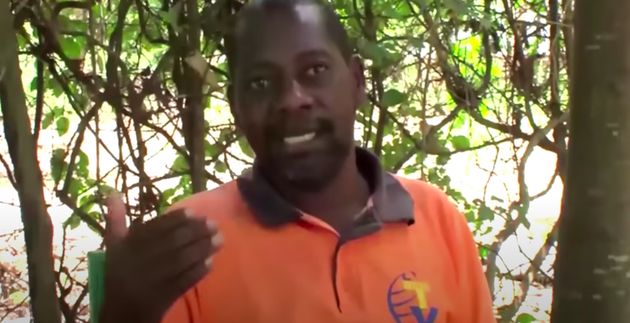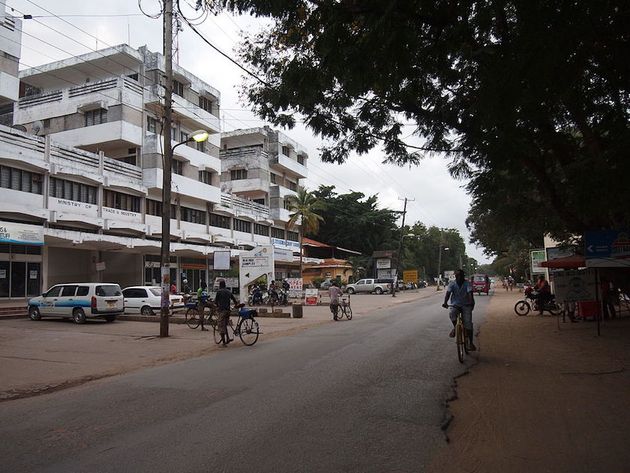As the leader of the self-proclaimed Good News International Church movement goes on trial, the national Evangelical Alliance condemns the tragedy and calls for legal action.
 A hundred bodies have already been unearthed from the Shakahola forest, where Paul Mackenzie's cult was based since 2019. / Screenshot from YouTube, BBC.
A hundred bodies have already been unearthed from the Shakahola forest, where Paul Mackenzie's cult was based since 2019. / Screenshot from YouTube, BBC.
On 24 April, news of 48 bodies found in the Shakahola forest in the coastal county of Kilifi (Kenya) was reported internationally. The media's main focus was that they were victims of a cult who had been encouraged to “fast to meet Jesus”.
The leader of the self-proclaimed Good News International Church, Paul Mackenzie Nthenge, was arrested and brought to justice, while authorities continued to find more bodies in makeshift graves on a 300-hectare site, bringing the death toll to nearly 100.
Among the starvation victims were also eight emaciated people, who later died in the local hospital.
The case has had such a media impact both inside and outside of Kenya, that even the country's president, William Ruto, appeared in a press conference to explain that he had “instructed the agencies responsible to get to the root cause and to the bottom of the activities of people who want to use religion to advance weird, unacceptable ideology”.
Ruto defined Mackenzie as “a terrible criminal. People like him do not belong to any religion, they belong to jail and that is where they should be”.
Paul Mackenzie was working as a taxi driver in Nairobi when, in 2003, he left the capital to move to the coast and open a small church.
“He was following the teachings of William Branham, one of the most controversial Pentecostal leaders of he beginning of the last century. He established the church in his wife's village in Malindi, which is how his group is popularly known”, explains José de Segovia, a Spanish theologian, writer and specialist in cults.
Mackenzie's movement opened several communities in different parts of Kenya, reaching over 3,000 members, 1,000 of them in the Malindi group. In 2017 he publicly clashed with the country's authorities, being arrested twice.
Among other things, Mackenzie banned his followers from trading money or wearing wigs, and claimed that his messages anticipated “the end times” and that he brought “the gospel of our Lord Jesus Christ free from the deception and intellect of man”.

In 2019 he closed the church in Malindi and moved to the inland town of Shakahola, justifying the decision as a “revelation”.
“The Kenyan case may remind us of Jonestown, the People's Temple community that Jim Jones moved from San Francisco to Guyana, because after confronting the authorities he began an exodus like Jones, which led him to form a remote jungle commune, like Jonestown, where 110 have died of starvation to 'find Jesus'”, points out De Segovia.
According to Harvey Kwiyani, a Malawian theologian based in the UK, “MacKenzie’s case has its peculiarities”. For example, he says, “the ploys of charismatic leaders who were not honestly accountable to fellow Christian leaders in the area, and the strategic choice to have their community in a forest away from wider society”.
“We can also talk about the message preached, that fasting till death seems ultra-spiritual, and comes with the promise of salvation from this earthly life. Or that the leaders had taken a strong anti-education position that prevented children from going to school, in a bid to prevent foreign information and influence”, underlines Kwiyani.
“Historically, cults abound where the church is growing. It is a parallel phenomenon, which is already found in the New Testament. Van Baalen said that they are 'the unpaid bills of the Church'”, explains De Segovia.
Furthermore, “cults are a response to voids in the church, to faults and silences that they try to cover up with false teachings and revelations, which lead to authoritarian structures of manipulation and abuse”.
“These movements sometimes create organisations, but others they simply foster a cultish spirit. But their explanation is not only economic, as many believe. They respond to real problems, but their solutions are wrong”.
Several publications report a fast growth of Charismatics and Pentecostalism on the African continent. For example, according to Africa Supreme, 20% of the combined population of Kenya, Uganda, South Sudan, Malawi and Burundi are members of Pentecostal churches. Or in 2014, there were at least 10,000 Pentecostal churches in Ghana alone.
It is in that context, that more and more cultish or 'prosperity gospel' type movements have appeared as well.
“A great deal of this happens because in many parts of Africa, Christianity is understood as a foreign religion (even though this is not always the case). People seeking to make it more native, or to enjoy the power and leadership, or even those that are generally suspicious of outside influence, disenfranchised by colonialism, tend to form their own faith communities, where they can mislead people without accountability”, explains Kwiyani.
For the Malawian theologian, “cults are not necessarily an African phenomenon, but many people in Africa today are susceptible to them. The challenges of the contemporary African life that is, to a large extent, shaped by the promise of a better life that comes as a reward for some acts of faith. Even the promise of a better life in heaven, as was the case with the community in Kenya, can cause people to join such cultic communities”.
This cult phenomenon, says de Segovia, “has little to do today with the cults of the 19th century, which are now studied in American universities as 'American religions', just as those from the second half of the last century are no longer 'new religious movements'”.
“'Cult' is always a pejorative term, a weapon of war, the worst thing you can say about a religious group. It always implies social danger, economic exploitation and psychological manipulation. It is so loaded with prejudice that it prevents us from understanding what these movements are really about and why the majority of people are there because they want to be”, he adds.
De Segovia points out that “the world has become smaller and what used to be a typically American phenomenon is now happening everywhere. There is an interconnection, not only technological through the internet, but also cultural and economic dependence, which makes it very complicated to know where some ideas and movements come from”.

While the investigation and trial are still underway, there is a recurring question of how to help prevent events such as the one in Shakahola forest.
According to De Segovia, “the best prevention to avoid these cultist deviations is, first of all, to follow the teaching of the Bible and not prophecies, such as that of Mackenzie or William Branham”.
“Secondly, be suspicious of a ministry of 'heavy pastorship', which makes people dependent on pastoral advice and blessing, as if their authority were that of God Himself. And finally, question the imposition of spiritual disciplines such as fasting, which are personal and voluntary but which are set up in some churches as practices that everyone must follow in order to 'find Jesus'”, he stresses.
Kwiyani emphasises that “it is essential to develop proper accountability measures among Christian leaders in every locality and in denominations, and closer government oversight with a requirement to report, especially when vulnerable people are involved, because charismatic leaders, left to their own devices, can cause problems".
He also warns that “charismatic spiritual leadership is on the rise in Africa, a great deal of those leaders are also often anti-intellectual and therefore deeply suspicious of theological education. Yet, theological education is what is needed, a theology that can actually speak to contexts where charismatic leadership is normative. a theology of the body of Christ) that says we are all one and we need one another”.
“The life of each member of the body depends on others around that member. The entire body's vitality depends on the connections between the members. When we see one of us excluding themselves, we need to respond accordingly”, concludes Kwiyani .
[analysis]
[title] Kenya Evangelical Alliance condemns the case [/title]
[text]The Evangelical Alliance of Kenya (EAK), which represents around 50,000 churches in the country, said it “categorically condemns the act of murder and senseless massacre of innocent Kenyans”
“We find these acts by this cultic sect led by Paul Mackenzie to be utterly despicable, immoral, irreligious and against every Christian tenet and any other human values acceptable in any society”, the EAK says in a statement.
“It is a clear abuse and misuse of religion and despicable exploitation of innocent and unsuspecting citizens”, so that they “urge Kenyans to utterly disassociate with any such religious organisation, church or fellowship”.
“What has been experienced is cultic and we encourage the populace to be vigilant. We also implore the security apparatus to do their job and bring every perpetrator or any persons associated with this cult”, adds the statement.
The Evangelical Alliance asks Ruto to create a commission of inquiry led by a distinguished Christian coordinating bodies, such as National Council of Churches of Kenya (NCCK) or the Kenya Conference of Catholic Bishops (KCCB),
That commission will “investigate and report back what might have gone on and make clear recommendations of how to fully regulate registration and operations of Churches and Christian institutions in the country”.
The evangelical entity also calls on the prosecution and judiciary to apply strict measures applicable to terrorism, genocide and crimes against humanity.
“We further advise the government to empower the recognized umbrella organizations to streamline self-regulation for common good and order. On our part as EAK, we have a clear code of conduct for all our members”, concludes the EAK.[/text]
[/analysis]
Las opiniones vertidas por nuestros colaboradores se realizan a nivel personal, pudiendo coincidir o no con la postura de la dirección de Protestante Digital.
Si quieres comentar o